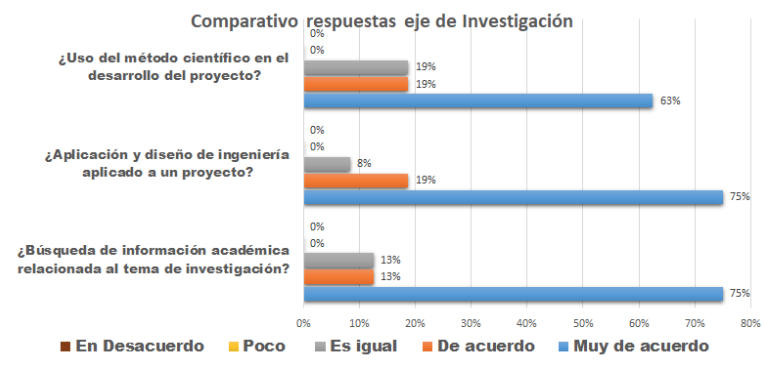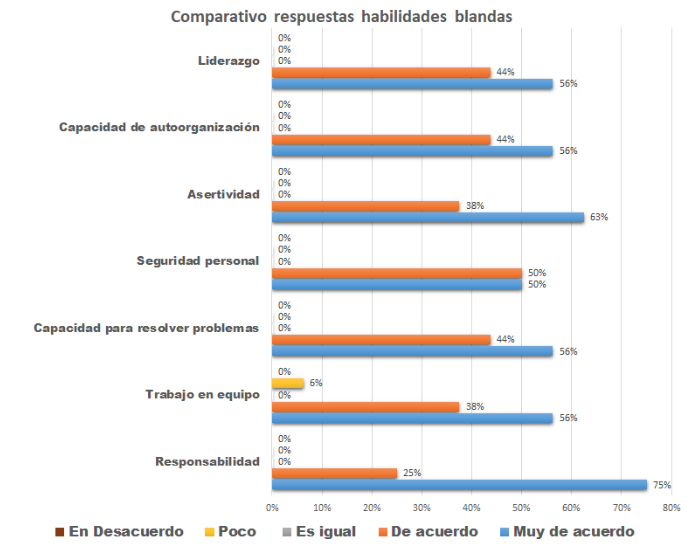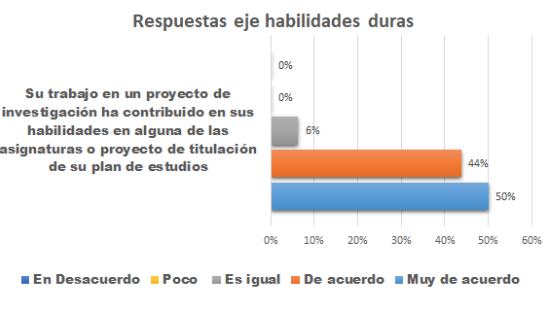

 Vol. 40 (Number 2) Year 2019. Page 22
Vol. 40 (Number 2) Year 2019. Page 22
Gustavo Adolfo MORENO Jiménez 1; Javier MARTINEZ-GOMEZ 2; Santiago Vladimir GÓMEZ Rosero 3; Diego Fernando BUSTAMANTE Villagómez 4
Received: 14/08/2018 • Approved: 20/12/2018 • Published 21/01/2019
ABSTRACT: The present work exposes, by means of theoretical and practical foundations, the exploratory results on the: academic and behavioral effects from the participation of students in the research projects. The data was collected from three ongoing research projects within the Mechanical Engineering Area, where three project managers, eight teachers, twelve undergraduate students and four graduate students participate, obtaining 76% of acceptance of responses from the total number of respondents. In order to evaluate the effects a survey has been prepared covering the following aspects: research skills; soft skills development; hard skills development; and motivation. The results of the applied survey are presented where it can be glimpse a positive effect in the development of your competences measured from four fundamental aspects for your professional performance such as: contents, your personal, motivational and sentimental resources. |
RESUMEN: El presente trabajo expone, mediante fundamentos teóricos y prácticos, los resultados exploratorios sobre los efectos: académicos y comportamentales que tiene la participación de estudiantes en los proyectos de investigación. Los datos se recogen de tres proyectos de investigación en curso dentro del el Área de Ingeniería Mecánica donde participan tres jefes de proyecto, ocho docentes, doce estudiantes de pregrado y cuatro de postgrado, obteniendo un 76% de aceptación de respuestas del total de encuestados. Para evaluar los efectos por parte de los alumnos se ha elaborado una encuesta que cubre los siguientes aspectos: habilidades de investigación; desarrollo de habilidades blandas; desarrollo de habilidades duras; y motivación. Se presentan los resultados de la encuesta aplicada donde se puede entrever un efecto positivo en el desarrollo de sus competencias medidas desde cuatro aspectos fundamentales para su desempeño profesional como son: los contenidos, sus recursos personológicos, motivacionales y sentimentales. |
Increasing motivation, self-learning, soft skills and hard skills in University students, is highly important in order to create professionals with high competency that have a good performance in a constant changing world. Various authors highlight its importance; e.g. Bacete & Betoret (2000) state that “motivation is the lever that moves all behavior, which allows us to provoke changes both at school level as well as life in general”. Other authors, such as G. Cabanach et al. present the cognitive and motivational process as a direct and inseparable relationship (1996). Gallar Pérez et al. (2017), expose the importance of the “improvement in the teaching-learning process from didactic and pedagogical actions”. For this, a transition is necessary, from an educational model focused in teaching towards a model focused in learning. It represents a big cultural change.
Among the active methods there are: problem-based learning (PBL), project-based learning, simulation and games, case study, and others; which allow the leading function of students in the teaching-learning process (Knowles, 1982; Slavin, 1990; Brown y Atkins, 1998; Duch et al, 2001, Gallar Pérez et al. 2017). These statements help us understand that the use of pedagogical techniques for learning is necessary in order to improve the continuous learning process.
Wood (2003) defines problem-based learning as a process that uses identified issues within a scenario to increase knowledge and understanding. The principles of this process are listed below:
Continuous improvement of learning can be supporting in the elaboration of projects. This methodology integrates systematically knowledge and action, it facilitates in students, the learning process of rational working methods, the ability to plan a project and its fulfillment in the allotted time, creativity, media selection, monitoring and evaluating results, which favors the development of the cooperative project and learning autonomy. (Duch et al 2001), Gallar Pérez et al. (2017).
When working with projects it is possible to evaluate in five stages or phases: opening stage, organization stage, development and monitoring stage, spreading and socialization stage, where communication of the project is encouraged with samples or exhibitions of what has been produced, and integration and evaluation stage. Browny Akins, (1988), Duch et al (2001), Gallar Pérez et al. (2017).
Problem-based learning addresses the need to promote lifelong learning through the process of inquiry and constructivist learning (Schmidt et al. 2011). PBL is considered a constructivist approach to instruction because it emphasizes collaborative and self-directed learning while being supported by tutor facilitation (Schmidt et al. 2006). Yew and Schmidt (2011), Schmidt, and Hung elaborate on the cognitive constructivist process of PBL:
PBL follows a constructivist perspective in learning as the role of the instructor is to guide and challenge the learning process rather than strictly providing knowledge (Hmelo Silver et al. 2006). From this perspective, feedback and reflection on the learning process and group dynamics are essential components of PBL. Students are considered to be active agents who engage in social knowledge construction. PBL assists in processes of creating meaning and building personal interpretations of the world based on experiences and interactions (Dolmans et al. 2005).PBL assists to guide the student from theory to practice during their journey through solving the problem
From the observations, made by the professors during their teaching time in the subjects from the degree program, and the research projects, there are relationships between motivation and learning. The objective of this research is to study what implications are research projects generating in the learning development of students from the research hotbed. After that the study objective was stated: to analyze the effects of students’ participation in research projects, through surveys, in order to improve the learning focus in engineering. When it was possible to verify that there is little previous information about this proposal inside the institution SEK, what was decided is to start with an exploratory survey that allows us to envisage tendencies in students. At the same time, it may give us the possibility to design methodologic tools that will facilitate the didactic improvement in the process of knowledge acquisition.
For this work, a direct exploratory research of the effects of hotbed (students) participation, who belong to the research area in Mechanical Engineering from the Architecture and Engineering Faculty of SEK International University, was made. Three projects were selected as participants, as they are detailed next:
-Promotion of industry in Ecuador through the selection and characterization of materials. In this project, eight professors from the faculty and nine students, from which three are undergraduate and six are graduate, participated.
-Validation of prototypes for exterior illumination, using LED high power technology: field tests. For this project we had the cooperation of five professors and five students, four of them undergraduate, and one graduate.
-Development of algorithms for search agents and environmental modification, emulating hive behavior. In this project three professors from the faculty, and five undergraduate students are working on.
Four core ideas were stablished to be explored, they include the development of soft abilities, hard abilities (the ones related to the degree), motivation and research abilities.
For this, a survey was laid out in order to be applied to the hotbed researchers from the participant projects. In order to compare the results better, a numeric scale from 1 (little) and 5 (a lot) was suggested.
For each thematic core idea, the questions were established as they are detailed below:
-Research abilities
Do you consider that being part of a research group has developed your research abilities in the following areas?
-Academic search for information related to the research topic?
-Engineering application and design, applied to a project?
-Use of the scientific method in the project development?
-Soft abilities
Do you consider that your participation in a research project has contributed in the development of the following soft abilities?
-Responsibility?
-Group work?
-Capacity to solve problems?
-Personal security?
-Assertiveness?
-Self-organization capacity?
-Leadership?
-Hard abilities
-Do you consider that your work in a research project has contributed in your abilities in any of the subjects or titling project from your curriculum?
-In how many subjects do you consider you have been able to increase your abilities and knowledge?
-Mention at least 3 subjects that you consider have had direct impact because of the research project.
-Motivation
-In your opinion, after being part of a research project, the motivation for your studies is: diminished, same continues, is increased.
-Would you recommend your classmates to take part in a research project?
As a result of the exploratory study, 16 from 22 students, distributed in 75% undergraduate and 25% graduate, answered the survey. The project with more students’ participation, 37,5%, which means 6 students, was Promotion of industry in Ecuador through the selection and characterization of materials; the other projects have the participation of 31,3%, which is 5 students each. Here are the results for each one of the thematic core ideas and specific questions:
The percentages of the answer for each one of the questions in the research core idea, are presented in figure 1, where it is possible to appreciate the favorable results. The use of the scientific method in the development of the project has improved. The perception is that 63% of students who took part in the research project, have improved their learning of the scientific method. The Engineering application and design has also been improved on the students’ side, where there are 12 answers in the area of totally agree, three answers in the level agree, and one answer in the level the same. Searching for academic information related with the research topic is shown in figure 1. In the questions, it is possible to see that almost two thirds of the participants have found that the research projects have helped them in searching other information; while the rest of the participants state that it has helped them in this ability.
Figure 1
Comparative answers for the research core ideas

The answers for the soft abilities core ideas are shown in figure 2. It is possible to see that in all the answer there are positive results, in the perception of the students, if they totally agree or agree in the improvement of the soft abilities. The results include abilities such as leadership, self-organization, assertiveness, personal security, problem solving capacity, team work and responsibility.
Figure 2
Comparative answers for the core idea soft abilities

Figure 3 shows the answers from the core idea of hard abilities, where how the research project has contributed in their abilities in any titling subject have been considered. Here most of the surveyed people show they agree or totally agree.
Figure 3
Hard abilities: research and contribution to the subjects

Another question that was asked was in how many subjects has the abilities and knowledge improved, where the answers vary between three and five subjects, with the highest percentage referring to four subjects, as figure 4a shows. Question 3, belonging to this core idea, is an open question, where students are allowed to indicate which subjects they consider have been the ones that have received more influence for their research projects, as shown in figure 4b. What could be seen is that undergraduate subjects have more influence from the research students, with more votes subjects as programming, electrotechnical subjects, CAD, and materials science. The other items, both from undergraduate and graduate, are various subjects that do not represent votes higher than 2.
Figure 4
Questions 2 and 3 referring to the hard abilities core idea.
A) Number of subjects that the research has influenced,
B) Subjects with more perception from surveyed students’ side.

Figure 5
Questions 1 and 2 from the core idea motivation.
a) Motivation in studies due to research,
b) Motivation and recommendation

In this research the effects on students’ participation in research projects have been analyzed through surveys, in order to improve the learning focus in engineering. It has been stated that the methodology through surveys has been able to give us an idea of the perception from the students’ side.
In all the cases, the answers from the soft abilities core idea showed that the perception from the students’ side is a total agreement or agreement in the improvement of abilities such as leadership, self-organization capacity, assertiveness, personal security, problem solving capacity, team work, and responsibility.
Participation in projects have increased knowledge in various subjects from the curriculum, which makes it very interesting for developing integrative projects in various subjects, or that various subjects may have one part of their evaluation through participating in a project.
Bacete, F. J. G., & Betoret, F. D. (2000). Motivación, aprendizaje y rendimiento escolar. Revista española de motivación y emoción, 1(11), 55-65.
Brown, G. y Akins, M. (1988). Effective teaching in Higher Education. Ed. Routledge: Londres.
Dolmans, Diana H J M; De Grave, Willem; Wolfhagen, Ineke H A P; Van Der Vleuten, Cees P M (2005). "Problem-based learning: Future challenges for educational practice and research". Medical Education. 39 (7): 732–41.
Duch, B.J., Groh, S.E., Allen, D.E. (2001). The Power of Problem Based Learning. Stylus, N.Y.
Gallar Pérez Y., Barrios Queipo E. A., Chávez Rivera, M. E., Rodríguez Zaldívar I. E., (2017) Alternativas de metodologías activas en el marco del proyecto ?mejora del proceso de enseñanza aprendizaje desde acciones pedagógicas y didácticas? en la Universidad Internacional SEK. 3er Congreso internacional de ciencias pedagógicas en Ecuador.
Hmelo-Silver, Cindy E.; Barrows, Howard S. (2006). "Goals and Strategies of a Problem-based Learning Facilitator". Interdisciplinary Journal of Problem-based Learning
Knowles, M. S. (1982): El estudio auto dirigido: guía para estudiantes y profesores. México: Alhambra Mexicana.
Schmidt, Henk G; Rotgans, Jerome I; Yew, Elaine HJ (2011). "The process of problem-based learning: What works and why". Medical Education. 45 (8): 792–806.
Schmidt, Henk G.; Loyens, Sofie M. M.; Van Gog, Tamara; Paas, Fred (2007). "Problem-Based Learningis Compatible with Human Cognitive Architecture: Commentary on Kirschner, Sweller, and Clark (2006)". Educational Psychologist. 42 (2): 91–7.
Slavin, R.E. (1990). Cooperative learning. New Jersey: Prentice-Hall.
Wood, Diana. (2003). "ABC of learning and teaching in medicine: Problem based learning". British Medical Journal. 326: 328–330.
Yew, Elaine H. J.; Schmidt, Henk G. (2011). "What students learn in problem-based learning: A process analysis". Instructional Science. 40 (2): 371–95.
1. Master of Science Technology Management Gustavo Moreno, Academic staff, Universidad Internacional SEK – Quito. e-mail: gustavo.moreno@uisek.edu.ec
2. PhD in Material Science and Engineering Javier Martínez Gómez, Academic staff, Universidad Internacional SEK – Quito. Research at Instituto Nacional de Eficiencia Energética y Energías Renovables (INER), Quito, Ecuador. e-mail: javier.martinez@uisek.edu.ec
3. Mestre em Ciências em Engenharia Santiago Gómez Academic staff, Universidad Internacional SEK – Quito. e-mail: santiago.gomez@uisek.edu.ec
4. Master of Mechanic Designee Diego Bustamante, Academic staff, Universidad Internacional SEK – Quito. e-mail: diego.bustamante@uisek.edu.ec